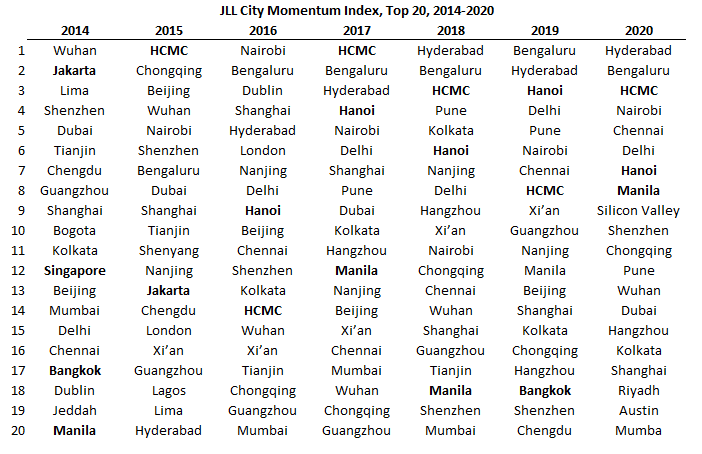More catching up and Happy Tet!
/More catching up on stories that I missed. Of course, I hope everyone is enjoying their Tet festivities. And not worrying too much about the coronavirus.
Vietnamese cities have lots of forward momentum
For comparability, the CMI ranks for the period 2014-2018 represent the short-term momentum indices. Source: JLL, 2020
JLL puts out an index that tracks the momentum of major cities every year. It turns out that Asia is over-represented every year, for good reason (lots of growth, young, etc.). In 2020, for the first time in a while, there are two US cities in the index: Austin and Silicon Valley. There is one for Africa (Nairobi) and two for the Middle East (Dubai and Riyadh, which actually are in Asia, but are sometimes not counted that way).
Big news for Vietnam: HCMC and Hanoi are high up on the list!
These two cities are highly ranked by JLL because:
Strong growth: 8%+.
Infrastructure investment: Both Hanoi and HCMC are putting in metros, although they are very delayed…
Smart cities: I still don’t really get what this is. Basically having more parts of the city connected and using data more to make decisions.
New downtowns: They also mention building up Thu Thiem in HCMC to take pressure off the historic downtown.
Young pop: And HCMC is higher than Hanoi because it has a greater “engine room” population (people aged 20-40), and that demographic is growing, while it is likely to shrink in Hanoi (according to JLL) and in most other global cities.
Not much new here, but it is interesting to see consensus forming around Vietnam’s strong potential.
More solar
The Asian Development Bank (ADB) is financing a 50MW solar project near HCMC. This equates to $0.76m per MW, which seems pretty good, I think. There was an announcement a while ago of two plants to be built for about $740m with about 740MW of capacity, so about $1m per MW. (Unfortunately, I can’t find the source right now for this older story.)
This is just part of the push at the big development banks to fund more climate-friendly projects. The IFC is putting $212m into VPBank to lend to SMEs:
The funds are expected to help VPBank expand lending to micro, small-, and medium-sized enterprises (SMEs), especially those owned by women, as well as import and export firms.
About a third is to be earmarked for climate-friendly projects.
At least the development banks are stepping in to help promote renewables. Good for the country and the world.
Update on 5G
2020 is the year of 5G. Or at least that is what Viettel is saying. It will launch its 5G service in June, although very few people will be able to use, unless they get one of the new phones that can use 5G. Here is a list of phones that work with 5G for the US market: Samsung, OnePlus, LG, Moto are all in there. Huawei also has a 5G phone, and Vinsmart says it will have one in July.
The interesting thing about 5G in Vietnam is that Viettel is building its own 5G equipment. It really looks like Vietnam doesn’t want to buy equipment from Huawei, which probably makes the US happy. Unfortunately, it will be hard for Viettel to compete. Ericsson spends $4bn on R&D, that’s 50% of Viettel’s revenue!
Vietnam’s airline market is rough
This is a bit old now, but I thought it was interesting to see that Vinpearl never got off the ground. Warren Buffet famously said that he would never invest in airlines. They had been very bad bets for investors for a century, basically, with almost 100 bankruptcies. He now owns them because consolidation in the US has made them much better investments.
Unfortunately for investors but fortunately for consumers, the airlines in Vietnam are still competing heavily. Vingroup decided to forego an entry into a market that it sees as oversupplied, despite super strong growth:
“Quang [Deputy Chairman and CEO] stated that the aviation market in Vietnam is still growing, and that there is still potential there. But he also warned that it is reaching the point of oversupply.”
Vinpearl would have been the 6th airline. The last to launch was Bamboo, which started flights last January and has 25 planes in service. It flies mostly domestically.
It really seems like Vingroup is trying to focus a bit more, rather than be a conglomerate to own all conglomerates. It has cars, telephones (see above for Vinfast), real estate, hospitality, and a university, among others! It got out of the retail business, and now airlines. That’s some progress. I have a bias here: I think companies should focus on just one thing, rather than trying to do everything. But, what do I know. I’ve never built a multi-billion dollar business.


